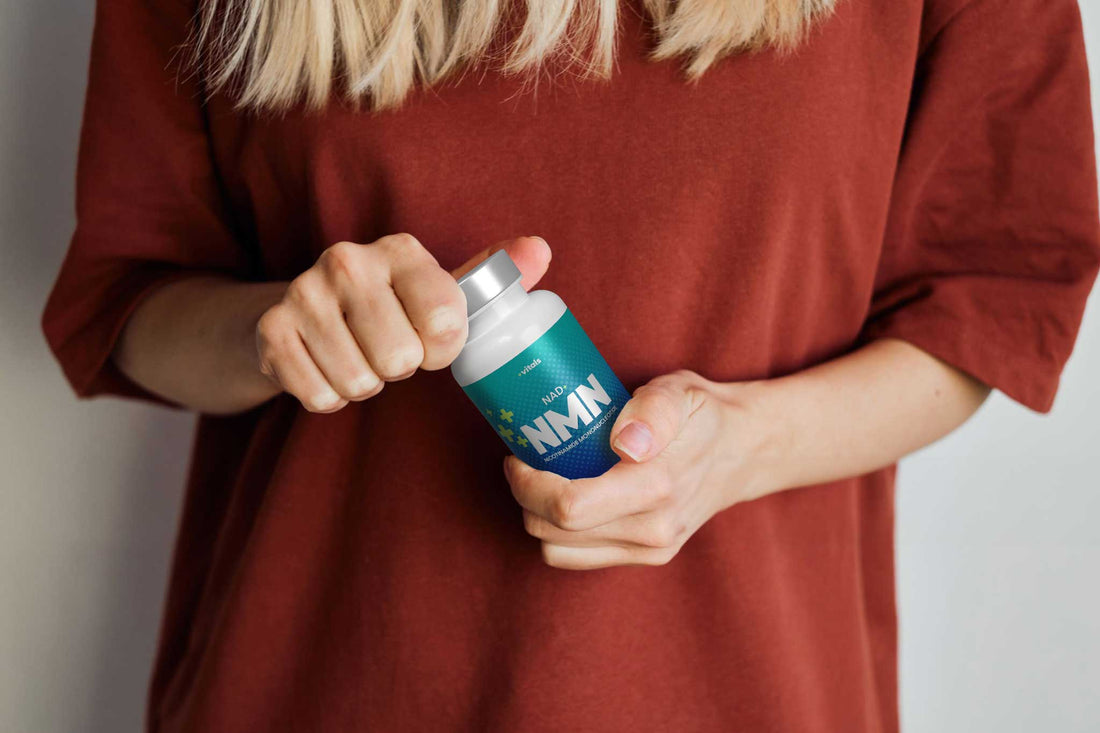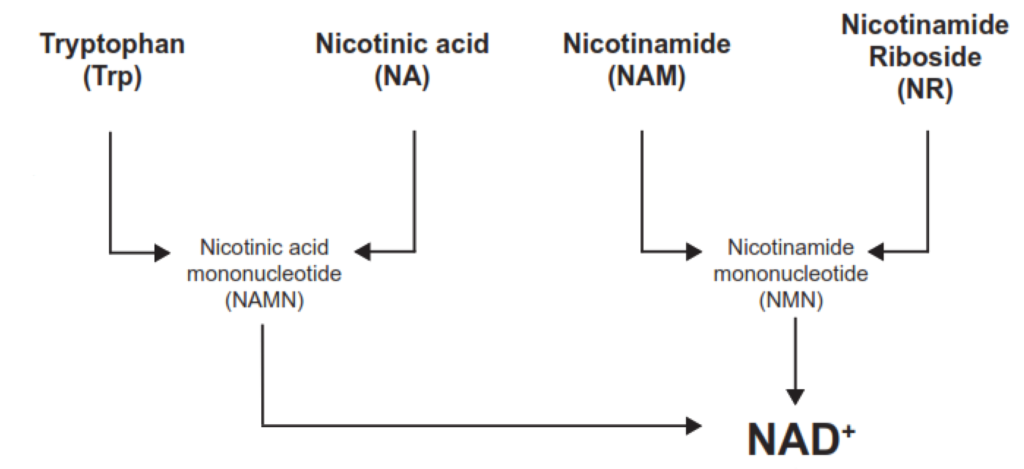
Is NMN just Vitamin B3?
Share
The differences between NMN, Niacin, and Vitamin B3
These three closely related compounds often cause confusion: NMN (Nicotinamide Mononucleotide), Niacin, and Vitamin B3. People often ask, "Is NMN just Vitamin B3"? These three compounds do share some similarities but they also have distinct characteristics and potential health benefits.

Image: Vitamin B3 (Niacin) and NMN (Nicotinamide Mononucleotide) Molecules
The Vitamin B3 Family
Here's a quick rundown of the relationship between these compunds:
1. Vitamin B3 (Niacin) Vitamin B3, also known as niacin, is a water-soluble vitamin that plays a crucial role in various bodily functions. It exists in two primary forms:
- Nicotinic acid
- Nicotinamide (also called niacinamide)
2. Nicotinamide Mononucleotide (NMN) is a substance related to vitamin B3 (niacin). It's important because it helps the body produce NAD+, a key molecule that cells need for energy and repairing DNA. Essentially, NMN is like fuel that helps keep your cells running smoothly and staying healthy.

(Image: Canto 2022) Vitamin B3 (NA, NAM and NR) and NMN are converted to NAD+.
The Vitamin B3 Complex Similarities and Differences
Right now let's get nerdy. While NMN, niacin, and vitamin B3 are related, they have distinct characteristics:
1. Chemical Structure
- Niacin (Vitamin B3): C6H5NO2
- Nicotinamide: C6H6N2O
- NMN: C11H15N2O8P
2. Absorption and Metabolism
- Niacin: Readily absorbed in the gut and converted to NAD+
- Nicotinamide: Also well-absorbed and converted to NAD+
- NMN: Absorbed through the small intestine and rapidly converted to NAD+
3. Primary Functions
- Niacin: Supports energy metabolism, DNA repair, and cardiovascular health
- Nicotinamide: Similar functions to niacin, with less impact on blood lipids
- NMN: Precursor to NAD+, supporting cellular energy production and longevity pathways

Nicotinamide mononucleotide (NMN) is similar to nicotinamide riboside (NR) but has a phosphate group (yellow). NRK (nicotinamide riboside kinase) is the enzyme that converts NR to NMN in cells.
Niacin (Vitamin B3) is the foundation
Niacin, as the primary form of Vitamin B3, plays a crucial role in numerous bodily functions:
1. Energy Production Niacin is essential for the conversion of food into usable energy by helping to form NAD+ and NADP (Nicotinamide Adenine Dinucleotide Phosphate).
2. DNA Repair As a precursor to NAD+, niacin supports enzymes involved in DNA repair processes, helping maintain genomic stability.
3. Cardiovascular Health Niacin has been shown to improve lipid profiles by:
- Lowering LDL (bad) cholesterol
- Increasing HDL (good) cholesterol
- Reducing triglycerides
4. Skin Health Niacin supports skin barrier function and may help improve various skin conditions.
5. Brain Function Adequate niacin intake is crucial for proper brain function and may help prevent cognitive decline.

Some different sources of Niacin:
- Meat (especially liver and kidney)
- Fish (tuna, salmon)
- Peanuts
- Whole Grains
- Fortified Cereals
The recommended daily intake of Niacin:
- Adult men: 16 mg
- Adult women: 14 mg (Source: National Institutes of Health - https://ods.od.nih.gov/factsheets/Niacin-HealthProfessional/)
Potential Side Effects:
High doses of niacin can cause skin flushing, itching, and gastrointestinal discomfort. Sustained high doses may lead to liver damage.
Nicotinamide Mononucleotide (NMN): The NAD+ Precursor
NMN has gained significant attention in recent years due to its potential anti-aging and health-promoting properties:
1. NAD+ Biosynthesis NMN is a direct precursor to NAD+, which declines with age. Supplementation may help boost NAD+ levels more efficiently than niacin.
2. Metabolic Health Research suggests NMN may improve insulin sensitivity and glucose tolerance, potentially benefiting metabolic health.
3. Cardiovascular Function Animal studies have shown that NMN supplementation may protect against heart disease and improve cardiovascular function.
4. Cognitive Function Emerging research indicates that NMN may support brain health and cognitive function, particularly in aging populations.
5. Longevity and Anti-Aging NMN activates sirtuins, a group of proteins associated with longevity and cellular health.
Sources of NMN:
Although NMN can be found in different food sources, it isn't enough to make any noticeable difference.
- Edamame
- Broccoli
- Avocado
- Tomatoes
- Beef

NMN Supplements:
NMN is available as a dietary supplement, with dosages typically ranging from 250-1000 mg per day. However, optimal dosage is still being researched.
Safety Profile:
Current research suggests that NMN is generally safe, but long-term human studies are still ongoing.
(Source: Nature Communications - https://www.nature.com/articles/s41467-018-03421-7)
Comparing NMN and Niacin: Key Differences
While both NMN and niacin contribute to NAD+ production, they have distinct characteristics:
- Efficiency in NAD+ Production NMN is a more direct precursor to NAD+ and may be more efficient in raising NAD+ levels, especially in older individuals.
- Cellular Uptake NMN can be directly taken up by cells through specific transporters, potentially leading to faster NAD+ synthesis.
- Side Effects Niacin, especially in high doses, can cause skin flushing and other side effects, while NMN appears to have a better tolerance profile.
- Research Focus NMN research is primarily focused on anti-aging and metabolic health, while niacin has been extensively studied for cardiovascular benefits.
- Availability and Cost Niacin is widely available and relatively inexpensive, while NMN supplements are newer to the market and typically more costly.
Choosing the Right Supplement: Factors to Consider
When deciding between NMN, niacin, or other Vitamin B3 supplements, consider the following:
1. Health Goals
- Cardiovascular health: Niacin may be more appropriate
- Anti-aging and metabolic health: NMN might be preferable
2. Current Health Status Consult with a healthcare provider to determine which supplement is most suitable for your individual needs.
3. Tolerance If you experience side effects from niacin, NMN may be a better alternative.
4. Budget NMN supplements are generally more expensive than niacin or other forms of Vitamin B3.
5. Research Support While niacin has decades of research behind it, NMN is still being studied for its long-term effects in humans
Remember to consult with a healthcare professional before starting any new supplement regimen, especially if you have pre-existing health conditions or are taking medications.
